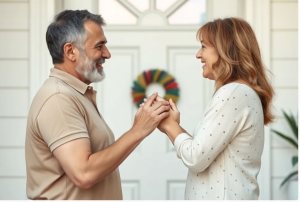Like most people, my journey to the land of enabling was fueled by the kindest intentions. I was trying to help a friend, which then grew into trying to save that friend. But after years of “helping” and “saving,” I was the one going under, and it was myself that I needed to save.
As an enabler, I felt powerless, imprisoned and paralyzed. And then I woke up. The catalyst in my awakening, my path to freedom, was actually a simple but profound question: “How is this experience for me?” This question broke my heart open, to itself, and in so doing, shattered the existing system. It became clear that not one moment in the entire eight-year hell had actually included me—what the stress and pain of this situation/relationship was doing to my soul, mind, health, wellbeing, spirit, happiness, family, children—my life.
I realized that the only way that I had allowed myself to exist in this relationship was as the victimizer, the one depriving her, not giving enough, not loving enough, not fixing the situation. The only attention I had offered myself throughout the years of “helping” was judgment: “Why couldn’t I be more compassionate—open my heart wider?” “How could I do this to her?”
In all those years, I had never stopped to feel inside my own heart, feel what it was like to be emotionally bullied, blamed and held responsible for something I did not create, controlled and resented by someone I loved—all the while attacking myself for not being infinitely kinder.
At last, my body let go of an ocean of pain; I became aware of the anguish, sadness, frustration, anger, self-blame, and really grief, that it had been carrying all this time. I suddenly knew that I was not to blame for what my friend had created or what would happen to her as a result of it. I was not guilty, or responsible for her life struggle, as she had convinced me. Not to blame was no longer just the concept I had heard a thousand times from friends, it was something I knew in my guts.
When we are enabling, we believe that because we can help, we should help, and that anything else is un-loving. We hold ourselves responsible for fixing a problem that we (usually) can’t fix. We convince ourselves that the enabled will self-destruct if we stop intervening, and that we are without compassion if we let that happen, even responsible for it happening. We resent giving more and yet hate ourselves for not giving more. Indeed, we are caught between two terrible options.
As enablers, our sense of blame and responsibility for the other’s suffering prevents us from being able to look at the situation rationally. Once I was released from self-blame, I discovered a saner and more separate place from which to see what was really happening. Less enmeshed and more self-loving, I noticed the following (all key elements of enabling relationships):
• Her financial situation had gotten worse not better. (My “help” was not helping.)
• Her resentment had swelled as she now linked my “help” with her disempowerment. I also had become resentful of her dependency and all that came with it.
• Despite years of promises, she had not come up with or implemented any new realistic ideas or plans to change the situation.
• Her sense of entitlement was intensifying.
• She had become increasingly defensive, refusing to seek help for her problem.
Compassion without wisdom is not only lacking boundaries, but also dangerous. Before this experience, I believed that giving from the heart meant giving without conditions, and that real generosity had no bounds. Boundary-less compassion was what I hoped to feel, and believed I was supposed to feel. So too, I believed I should give without needing anything, and without any real concern for how that giving was affecting me. This was misguided and ultimately, harmful compassion.
Finally, I realized that if the situation were going to change, I needed to change, literally to be a different person. The cycle of dependency would continue until I stopped participating and facilitating it. No miracle was going to happen other than the miracle of my own transformation and clarity.
I am no longer an enabler. And yet, I learned how easy it is to slip into this role, terrifyingly easy, even with the best of intentions and a lot of awareness. Considering my own pain, not just hers, was the first step. It allowed me to:
1. Trust that I was not to blame or responsible for her suffering.
2. Gauge realistically whether my “help” was actually helping.
3. Realize compassion without wisdom as imprudent and also dangerous.
4. Know that neither she nor the situation were going to change—I had to change.
Regardless of how deeply entrenched we are or how impossible it might feel to stop “enabling,” it is possible. If you’d asked me a year ago, I’d have told you that I would never get free, never be able to do it differently. No matter how or from where I looked at it, the consequences felt unbearable. And then I stopped looking at it—and just stopped.
As excruciating as it was to break the cycle, every aspect of my life, the relationship, and even her life, is better now. It wasn’t a smooth path to better, to a new truth, and it doesn’t always go this way, but until we wake up from the trance of enabling, we can’t even know what’s possible, much less dare to live something different.
Copyright 2015 Nancy Colier



2 Responses
Thank You for your story. I am realizing my own co-dependency situation with my 22 year old son. I never realized how much my “worry” causes me to enable. I am looking for a group, book, online course, etc for help. Any suggestions?
Thank you
hi karen,
sorry for the late reply, caused by a website glitch. you might investigate my book, “inviting a monkey to tea” and also,”co-dependent no more” (i can’t remember the author on that one, but it’s also helpful.
in support, nancy colier